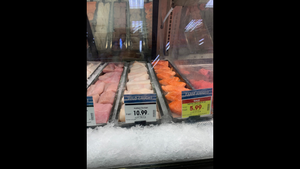Sprouts Makes ‘Progress’ in Transforming Its Stores
A return to its farmers market heritage is key to success, says CEO. A return to its farmers market heritage is key to success, CEO Jack Sinclair said in the company's third-quarter earnings report.
November 8, 2021

Sprouts Farmers Market is on a mission to regain its status as a destination.
The Phoenix-based grocer lost transactions earlier in the pandemic when consumers made fewer shopping trips—an unwelcome trend exacerbated by a shift away from its once-aggressive promotional pricing that further eroded traffic. But with sales gains made in the third quarter of 2021, Sprouts executives say they’re confident the company's stores are on the right track.
For the 13-week third quarter ended Oct. 3, 2021, Sprouts reported net sales of $1.5 billion—a 4% decrease from the same period in 2020 and a 5% increase from the same period in 2019. The sales decrease was due primarily to a decrease of 5.4% in comparable-store sales growth, according to the company. Two-year comparable-store sales growth also declined 2.1%. While the sales dip wasn’t the tumble that the Phoenix, Ariz.-based grocer took in the second quarter of 2021—which saw net sales down 7% and comparable store sales down 10%—there’s still “work to be done,” said CEO Jack Sinclair.
Sprouts net income for the third quarter of 2021 was $64 million; compared to net income of $60 million and adjusted net income of $62 million in the same period in 2020 and compared to net income of $26 million from the same period in 2019.
“Our third quarter sequential improvement in sales and robust profits, combined with the early performance of our two newly designed stores, give us confidence we are making progress in transforming Sprouts—built on the longstanding foundation of a farmers market heritage,” said Sinclair in a statement. “Moving forward, while there is work to be done, we are supported by a robust unit growth story, passionate team members, a loyal customer base, and our fresh differentiation, providing the ingredients for long-term success as a specialty store destination.”
In its recent third-quarter earnings call, Sinclair’s optimism about the company’s future was tempered by the acknowledgement that Sprouts has at times missed the mark on consumer messaging, especially when it comes to its produce offerings and pricing.
“We have the right strategy and are excited about moving it forward piece by piece, making great progress on our supply-chain-differentiated merchandise, new format and-real estate selections," Sinclair said during the earnings call, according to a Sentieo transcript. "However, our initial marketing messages fell short.” He added: “We fully expected to see a positive two-year stack in the back half of this year, and through the third quarter, we did not. With this in mind, we’re focused on delivering a clear message that highlights our sharp produce pricing, innovative products and a farmers-market experience to drive additional transactions in the quarters and years ahead.”
It’s been an uphill battle for Sprouts to bounce back from both the impact of COVID and pulling the plug on “ineffective and unprofitable” promotions, admitted Sinclair, who added that in the second quarter of 2020, Sprouts lost approximately 25% of its transactions. “To date, they have not returned,” he said. Additionally, the change to its promotional approach resulted in a loss of coupon clippers.
“What is encouraging is that those pre-pandemic customers that make up to 75% of transactions—that stuck with us—are putting more units in their basket today than they did in 2019, paying higher average prices via a combination of mix, fewer promotions and inflation, resulting in record third quarter profits. Our sales in the third quarter of this year were up 5%, and our earnings per share was up 155% when compared to the same period in 2019,” he continued.
Sprouts continues to refine its brand and marketing approach with “everyday great pricing and unique product offerings,” said Sinclair, adding that an updated store prototype—one with a differentiated product selection in a smaller, yet more efficient store—has resulted in higher financial returns and the ability to grow faster in new markets, thereby building density and brand awareness.
In terms of assortment, vitamins, deli, grocery and back-to-school offerings were key sales highlights for Sprouts in the third quarter. New on-trend, own-brand products also keep “the innovation train moving,” said the CEO. In the third quarter, Sprouts also reset its wine departments to feature more than 50 new selections focused on transparency and sustainability.
“The wines along with the other unique products mentioned are driving home the best part of a farmers market—exploring new and exciting products from people and companies with interesting stories and passions,” he said.
The innovation, product additions and a renewed emphasis on competitive pricing in produce are all part of Sprouts’ strategy to add profitable sales growth, get more customers in the door and create more loyalty with its target customers.
“Earlier this year, we fell short in communicating our commitment to great prices in our marketing, especially in produce,” said Sinclair. “While it was present in-store, we didn’t effectively communicate our value message to our customers. We began to address this imbalance in the third quarter by trying new things. Some worked, some didn’t.”
What worked were special events focused on its differentiation in the produce category (more local and new varieties and organic products), as well as actively promoting its competitive pricing.
"Throughout the third quarter, our traffic slightly improved each month, as we believe our customers responded to these new messages," said Sinclair.
"During the fourth quarter, we are continuing many of these tests on a broader scale. And we’re doing more mass media on Sprouts' strengths like promoting compelling, high-perceived value items that are more relevant to our core customer," he said. "As well, we continue to refine our broader brand message and campaign to attract those new customers still unaware of Sprouts’ differentiated store."
On the expansion front, Sprouts noted that because of supply-chain delays, approximately six new stores previously planned to open in the final quarter of 2021 could be delayed until 2022. The company further said it expects to open nine new stores in the fourth quarter of 2021 for a total of 14 new stores and one relocation this year.
Read more about:
Sprouts Farmers MarketAbout the Author
You May Also Like






